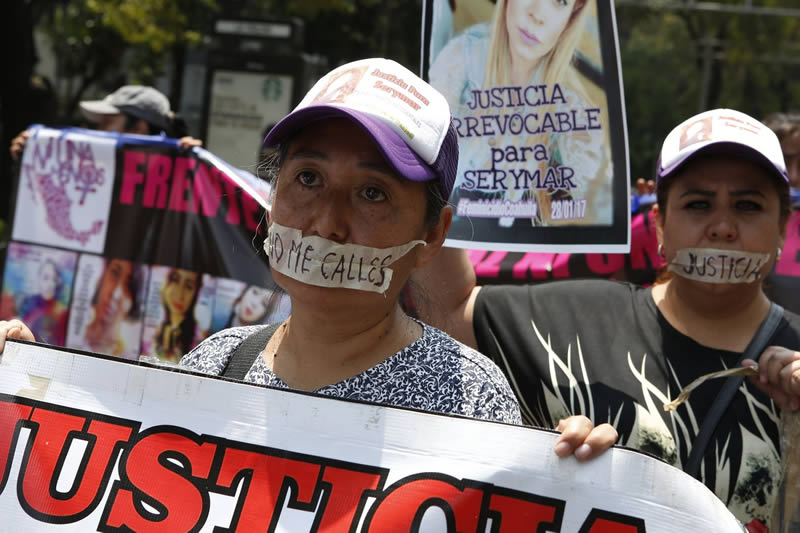By The Dallas Morning News and Associated Press
10:23 AM on Sep 9, 2019
https://www.dallasnews.com/espanol/al-dia/mexico/2019/09/09/analisis-las-tragicas-estadisticas-que-impulsan-las-marchas-en-protesta-a-la-violencia-contras-mujeres-en-mexico/
Mexico City – Mexican women cry out for more security in one of the most dangerous countries in the world to be a woman, and vandalism in recent protests has sparked a debate about what is the best way to draw attention to what many consider an urgent problem.
Hundreds returned to the streets of Mexico City on Sunday to demand justice for women who have been murdered, kidnapped or sexually abused. The march was led by people who have lost family or friends.
The protest began with an artistic work with glitter at the base of the statue of the Angel of Independence, followed by a silent march in which images of missing women and girls were shown.
Four out of 10 Mexican women will suffer sexual violence, such as unwanted touching or rape, throughout their lives, according to United Nations data. On average, nine women are killed a day in the country.
And that is only what can be documented, said Ramón Ramos, lawyer and former deputy director of public security in Mexico City.
“Violence against women is one of the biggest problems Mexico has,” said Ramos, who was scheduled to attend Sunday’s march.
The civil organization Mexico United Against Crime estimates that 90% of crimes in the country are not reported. Many victims see it as a futile exercise. In Mexico, the exception is that a crime is resolved, not vice versa. Only one in 10 reported crimes ends in a prison sentence.
How have women reacted?
Mexican women are fed up, and their outrage is growing at what they consider impunity for rapists and murderers.
Several demonstrations have been held in the country condemning violence against women since it was reported in August that the capital’s authorities were ignoring allegations that police officers had raped two minors.
The protests in the capital became known as the protests of the diamond, or glitter, after several women threw pink glitter on the city police chief.
In a protest in August, dozens of women caused damage to a bus station in Mexico City, sprayed the Angel of Independence monument with paint and set fire to a police station.
Damage to the monument outraged many people, but protesters pointed out that vandalism was a way of demanding measures in a serious situation, stating that some painting was nothing compared to a life destroyed by violence. Local authorities decided not to file charges for destruction of public property.
How do women feel?
80% of women in Mexico do not feel safe, according to a 2018 survey. Sexual harassment and aggressions are so common in public transport that the Mexico City subway reserves two wagons of each train exclusively for women.
Experts attribute widespread violence to macho attitudes about the role of women, combined with the deterioration of social values.
Activists also say that the process of reporting a crime is often painful, with long statements and hours of interrogation of whistleblowers. The judicial process, they claim, is plagued by situations in which victims are blamed. Women who suffer sexual assault are reproached for wearing revealing clothes, while dead women are often belittled, labeled as careless revelers or girlfriends of criminals.
What have the authorities done?
In recent decades, Mexico has improved its legal framework to better protect women and girls. Congress approved this year a constitutional amendment that allows the preventive detention of people accused of domestic violence for the second time.
Sentences for domestic violence depend on the severity of the injuries. For example, a bruise or a broken bone that takes more than 15 days, but less than 70, to heal can lead to a penalty of between six months and two years in prison, while causing life-threatening injuries can lead to up to eight years in jail
Rape carries a minimum penalty of six years, regardless of how chaste the woman is considered. Until 2002, rape convictions varied based on the alleged sexual innocence of women.
Sentences for abusing minors can be extended if the aggressor is a trusted person such as a teacher or stepfather.
Since 2011, the murders of women that include expressions of hatred, such as genital mutilation, carry a minimum sentence of 25 years in prison, compared to 20 of the common homicides.
What else can be done?
Activists would like more women to face their abusers. Often, women withdraw complaints against their husbands and boyfriends, they say.
But Ramos noted that the biggest problem is that laws often don’t apply. The complacency and ineptitude of the authorities encourage widespread crimes because the aggressors are not afraid of reprisals, he said.
“If one does not respect authority, less against a vulnerable person such as women,” Ramos said.






